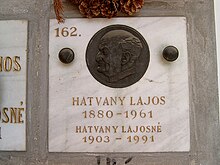Lajos Hatvany
Lajos Hatvany ; also Lajos Hatvany-Deutsch ; (born October 28, 1880 in Budapest ; Austria-Hungary as Ludwig Deutsch ; died January 12, 1961 in Budapest) was a Hungarian writer and literary critic.
Life
Ludwig Deutsch was born into a Jewish, Hungarian, upper-class family. His father, the sugar industrialist Alexander Deutsch (1852-1913), was made a baron in 1908 . In keeping with his status, he acquired the estate and castle in Hatvan and Hungarianized the family name after his place of residence in Hatvany-German, which eventually became Hatvany. The family's art collection was held together by the younger brother Ferenc von Hatvany until the closing days of World War II, when it was looted and confiscated by the Germans, Russians and Hungarians. Amália Moskowitz (the future writer Anna Lesznai ) was a cousin.
Lajos Hatvany converted to Catholicism in 1908. He studied philology at the University of Freiburg im Breisgau and received his doctorate from the University of Budapest . He worked as a journalist, writer, literary critic and literary scholar. He was a patron of the Hungarian literary scene and the midwife of the cultural magazine Nyugat , which Ignotus and Miksa Fenyő took over. Hatvany published about the Hungarian national poet Sándor Petőfi and about his poet friend Endre Ady . His correspondence is an important source of information on the intellectual scene in Hungary in the first half of the twentieth century. In 1913 he married the animal sculptor Christa Winsloe , they separated in 1922 and Hatvany married Jolán Somogyi, born in 1903 in 1924.
As a democrat, he was a member of the Hungarian National Assembly after the bourgeois democratic revolution in 1918 and took part as an interpreter in the Belgrade armistice negotiations. With President Mihály Károlyi , he left Hungary in July 1919 when the council government had taken power and could not return as a democrat when it was overthrown by Admiral Miklós Horthy . When he entered Horthy-Hungary in 1927, he was immediately charged and sentenced to seven years in prison and a heavy fine for reviling the Hungarian nation in magazine articles . The sentence was reduced to 18 months after international protests, including by Albert Einstein , Felix Salten and Franz Werfel , and Hatvany was released after nine months for health reasons.
In 1938 the anti-Semitic laws , which had already started in Hungary in 1920, were tightened and Hatvany had to emigrate again from Hungary. He went to England via Paris, from where he could not return until 1947. He received a chair in literary history at the University of Budapest , but withdrew from public life in Stalinist Hungary and wrote a biography of Petofi . In 1959 he was awarded the Kossuth Prize and in 1960 he became a member of the Hungarian Academy of Sciences .
Hatvany has written novels, poetry and plays. His main work Urak és emberek (1927) is under the influence of Thomas Manns Buddenbrooks . The Bildungsroman is at the same time a socio-historical analysis of the emancipation and assimilation of Jews in Hungarian society in the 19th century, which is why it was nicknamed Judenbrocks . Like its literary model, this novel also contains autobiographical references. Hatvany also wrote under the pseudonyms Pilvax and Agricola .
Hatvany's third wife, Erzsébet Marton Hatvany, who had stayed in Budapest in 1938, was only able to save herself from forced labor and deportation by the Eichmann Command and his Hungarian helpers in 1944 with a letter of protection issued by Raoul Wallenberg .
The street “Hatvany Lajos utca” in the 3rd district of Budapest was named after him.
Fonts (selection)
- The science of what is not worth knowing: a college notebook . Zeitler, Leipzig 1908
- Me and the books (self-reproach of the critic) . Paul Cassirer, Berlin 1910
- The famous: drama in 3 acts . G. Müller, Munich 1913
- The wounded land . Tal, Leipzig 1921
- Urak és emberek . Genius, Budapest 1927. German: Bondy jr. A novel . Own translation. Drei Masken Verlag, Munich 1929
- Ady: Cikkek, emlékezések, levelek . Szépirodalmi, Budapest 1959
- Rodion Markovits : Siberian Garrison. Novel among prisoners of war . Translated from the Hungarian by Ludwig Hatvany, edited by Ernst Weiss . Propylaeen, Berlin 1930. Reprinted in the Vossische Zeitung under the title Das Lager am Ussuri .
literature
- Hatvany, Lajos. In: Lexicon of German-Jewish Authors . Volume 10: Güde – Hein. Edited by the Bibliographia Judaica archive. Saur, Munich 2002, ISBN 3-598-22690-X , pp. 240-247.
- Hans Morgenstern: Jewish biographical lexicon. A collection of important personalities of Jewish origin from 1800, LIT Verlag, Vienna 2009 ISBN 978-3-8258-0509-8
- Sz.Péter Nagy: Hatvany Lajos , Budapest, 1993 ISBN 9637873295 (hu)
Web links
- Literature by and about Lajos Hatvany in the catalog of the German National Library
- Rita Horváth: Lajos Hatvany at YIVO
Individual evidence
- ↑ Lexicon of German-Jewish Authors, Volume 10, 2002, p. 241
- ↑ Lexicon of German-Jewish Authors, Volume 10, 2002, p. 246
- ↑ The letter of protection was auctioned off by Bauman rare books
| personal data | |
|---|---|
| SURNAME | Hatvany, Lajos |
| ALTERNATIVE NAMES | Hatvany-Deutsch, Lajos; German, Ludwig; Hatvany, Ludwig |
| BRIEF DESCRIPTION | Hungarian writer and politician, Member of Parliament |
| DATE OF BIRTH | October 28, 1880 |
| PLACE OF BIRTH | Budapest |
| DATE OF DEATH | January 12, 1961 |
| Place of death | Budapest |



